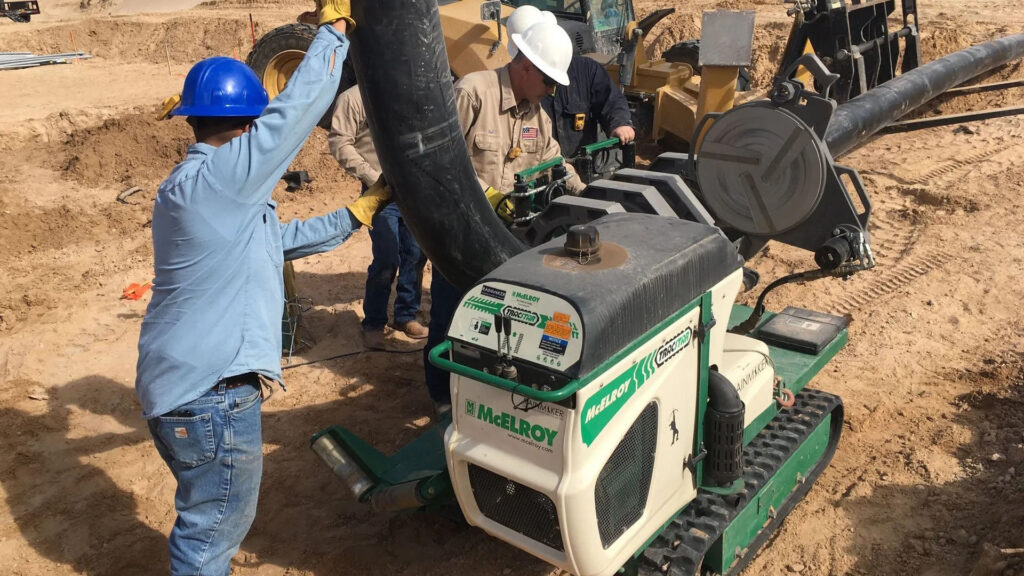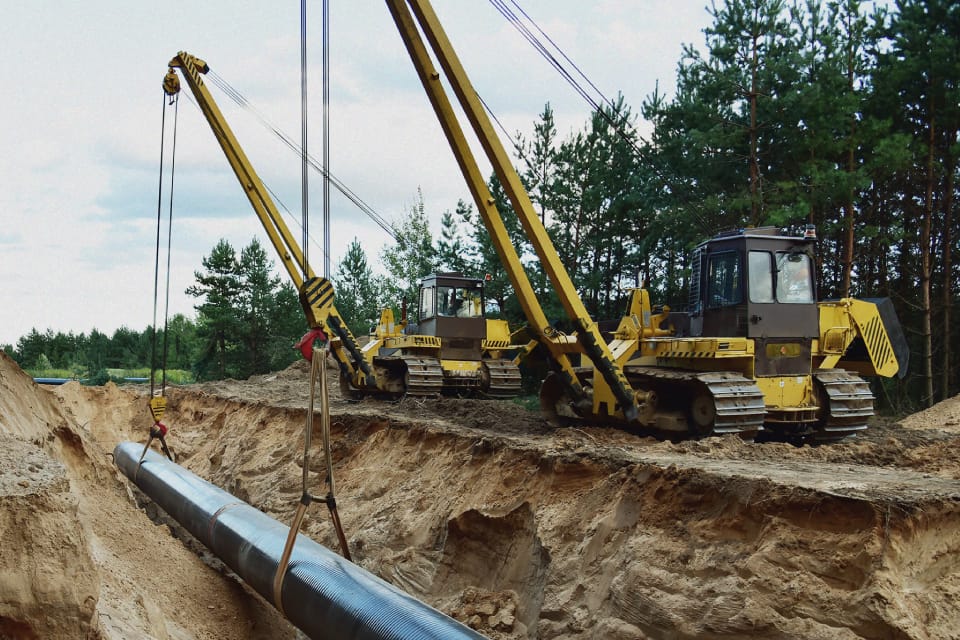The Role of Pipeline Construction Services in Modern Infrastructure
Wiki Article
The Essential Overview to Recognizing Pipeline Construction Services and Their Relevance
Pipeline Construction services are essential to the transport of essential sources such as gas, oil, and water. These solutions entail meticulous preparation and execution, adhering to strict safety and environmental requirements. As the industry adapts to modern obstacles, recognizing its parts and ramifications comes to be increasingly essential. What variables add to the expanding relevance of these solutions in today's economic climate? The complying with sections will certainly explore these important facets.Review of Pipeline Construction Providers
Pipeline Construction services encompass a variety of tasks important for the installment and upkeep of pipes made use of to move different substances, consisting of oil, water, and gas. These solutions are vital for guaranteeing the reliable and secure motion of resources from one area to another. The process normally starts with complete planning and style, which considers regulative requirements, environmental considerations, and logistical difficulties.As soon as preparation is complete, excavation and grading of the land are conducted to prepare the site for Pipeline setup. This is followed by the actual laying of the pipes, which involves welding or joining sections together to create a continuous flow path. After installation, strenuous testing is carried out to ensure honesty and safety. Upkeep services are also supplied to deal with any kind of problems that might arise over time. Generally, Pipeline Construction services play an essential function in sustaining framework for power and water distribution.
Trick Parts of Pipeline Construction
An effective Pipeline Construction task counts on numerous key parts that guarantee the risk-free and efficient setup of the Pipeline system. Thorough website analyses are critical, as they recognize the ecological and geographical elements that may influence Construction. Next, the option of proper materials, such as installations and pipes, is essential for safeguarding durability and compatibility with the delivered materials.Progressed Construction methods, consisting of trenchless technology and directional drilling, boost efficiency and reduce environmental impact. Efficient job administration is another crucial part, coordinating labor, tools, and timelines to fulfill task objectives.
Additionally, communication amongst stakeholders, consisting of engineers, specialists, and local authorities, assurances positioning on task specs and needs. Detailed quality control measures throughout the Construction process ensure compliance with market criteria and maximize the Pipeline's functional life-span. Jointly, these parts form the backbone of a successful Pipeline Construction task.
Security Specifications and Regulations in Pipeline Construction

Regulative bodies, such as the Occupational Security and Health And Wellness Administration (OSHA) and the Pipeline and Hazardous Products Security Administration (PHMSA), stated specific requirements that govern Construction techniques. These consist of procedures for equipment usage, worker training, and emergency situation reaction procedures. By carrying out these requirements, Construction business not only secure their staff members however likewise safe and secure public count on. Ultimately, rigorous precaution add to the lasting success of Pipeline tasks, guaranteeing they satisfy both ecological and operational expectations.
Environmental Factors To Consider in Pipeline Projects

Environmental factors to consider are integral to the preparation and implementation of Pipeline projects. These projects need to examine potential influence on environments, water resources, and local wildlife. Conducting extensive ecological effect analyses (EIAs) is important, allowing stakeholders to identify and alleviate threats prior to Construction begins.
Safeguarding delicate locations, such as environments and marshes, often needs applying specific layout features or alternate routing to lessen disruption. Furthermore, Pipeline drivers are charged with developing strategies for preventing leakages and spills, which can have destructive effects on the atmosphere.
Engagement with local communities is essential, as public concerns can bring about project modifications that improve ecological protection. Compliance with regulations established by ecological firms guarantees that jobs satisfy sustainability requirements, fostering an equilibrium in between facilities needs and eco-friendly conservation. Ultimately, attending to ecological considerations not only safeguards nature however additionally advertises neighborhood trust and job feasibility.
The Function of Technology in Pipeline Construction
Technology plays a necessary role in contemporary Pipeline Construction, improving efficiency and precision. Advanced surveying techniques permit accurate planning and implementation, decreasing ecological effect and job delays. Furthermore, the assimilation of automation and robotics simplifies procedures, decreasing labor costs and enhancing security on Construction sites.Advanced Surveying Strategies
Advanced evaluating methods play a necessary duty in the successful execution of Pipeline Construction tasks. These approaches utilize sophisticated modern technology to ensure exact mapping and evaluation of the terrain where pipes will certainly be mounted. Strategies such as Geographic Info Systems (GIS), LiDAR (Light Discovery and Ranging), and 3D modeling enable designers to picture and examine the landscape, identifying environmental worries and prospective obstacles. By making use of these advanced devices, teams this hyperlink can improve accuracy ready and positioning, greatly reducing the danger of errors during Construction. Additionally, real-time information collection allows for instant changes and notified decision-making throughout the project lifecycle. Inevitably, these evaluating innovations contribute to enhanced efficiency, look at here now safety, and sustainability in Pipeline Construction efforts.Automation and Robotics

Economic Influence of Pipeline Infrastructure
Pipeline framework plays an important duty in promoting and shaping regional economic situations profession. By providing a trusted ways of transferring oil, gas, and various other products, pipelines reduce transport prices and enhance supply chain performance. This framework brings in investment, boosts work development, and cultivates economic development in surrounding areas.The Construction and upkeep of pipelines contribute significantly to neighborhood economic climates, creating various work possibilities in various fields, from engineering to labor. The influx of work typically leads to enhanced spending in regional businesses, even more reinforcing economic activity.
Additionally, pipes enhance energy safety by making sure a steady supply of resources, which is vital for commercial procedures and property needs. As areas come to be interconnected through Pipeline networks, they access to wider markets, raising competitiveness and financial resilience. Subsequently, the financial impact of Pipeline framework is multifaceted, affecting both immediate neighborhood economic climates and more comprehensive local development.
Future Patterns in Pipeline Construction Services
The future of Pipeline Construction solutions is developing in feedback to technological developments, regulative adjustments, and growing environmental factors to consider. Innovations such as robotics and drones are improving evaluation and maintenance procedures, boosting security and performance. Automation is positioned to decrease labor costs and enhance accuracy in Construction operations. Furthermore, the raising focus on sustainability is prompting companies to take on environment-friendly materials and practices, aligning with worldwide initiatives to minimize carbon impacts.Regulatory frameworks are likewise adjusting to attend to environmental effects, promoting greater openness and accountability in Pipeline tasks. The integration of smart technologies, including real-time monitoring systems, is expected to enhance the integrity and efficiency of Pipeline networks. As energy demands shift towards eco-friendly resources, Pipeline Construction solutions will likely see a surge in projects connected to biofuels and hydrogen transportation. Overall, these trends suggest a transformative duration for the Pipeline Construction market, focused on advancement and sustainability.
Often Asked Concerns
What Sorts of Pipelines Are Typically Built?
this post Numerous kinds of pipelines are frequently built, including oil, gas, water, and sewage pipelines - Pipeline Construction Services. Each serves distinctive purposes, assisting in the transport of vital resources across areas while adhering to safety and environmental regulationsThe length of time Does a Normal Pipeline Task Take?
The duration of a normal Pipeline project differs substantially, commonly varying from a number of months to a couple of years. Factors affecting this timeline consist of project complexity, governing authorizations, and ecological factors to consider that need to be attended to.Who Regulates Pipeline Construction Companies?
Pipeline Construction firms are managed by different government, state, and regional companies, consisting of the Pipeline and Hazardous Materials Safety Administration (PHMSA) and state public utility commissions, guaranteeing compliance with safety and security and environmental requirements throughout the Construction procedure.What Prevail Products Used in Pipeline Construction?
Usual materials utilized in Pipeline Construction consist of polyethylene, steel, and pvc. Each product offers distinctive advantages such as sturdiness, adaptability, and resistance to rust, making them suitable for different applications in delivering gases and fluids.
Just How Are Pipeline Construction Costs Approximated?
Pipeline Construction expenses are approximated by assessing variables such as material expenditures, labor prices, task complexity, environmental considerations, and regulative requirements (Pipeline Construction Services). Precise cost estimate assurances reliable budgeting and task preparation throughout the Construction processPipeline Construction solutions encompass a range of tasks important for the installation and maintenance of pipes utilized to move numerous materials, including oil, gas, and water. An effective Pipeline Construction task counts on several key elements that assure the efficient and safe installation of the Pipeline system. Advanced checking strategies play a vital role in the effective implementation of Pipeline Construction tasks. Numerous types of pipelines are typically constructed, consisting of oil, sewage, gas, and water pipelines. Pipeline Construction costs are estimated by analyzing aspects such as product expenditures, labor prices, job complexity, ecological factors to consider, and regulative requirements.
Report this wiki page